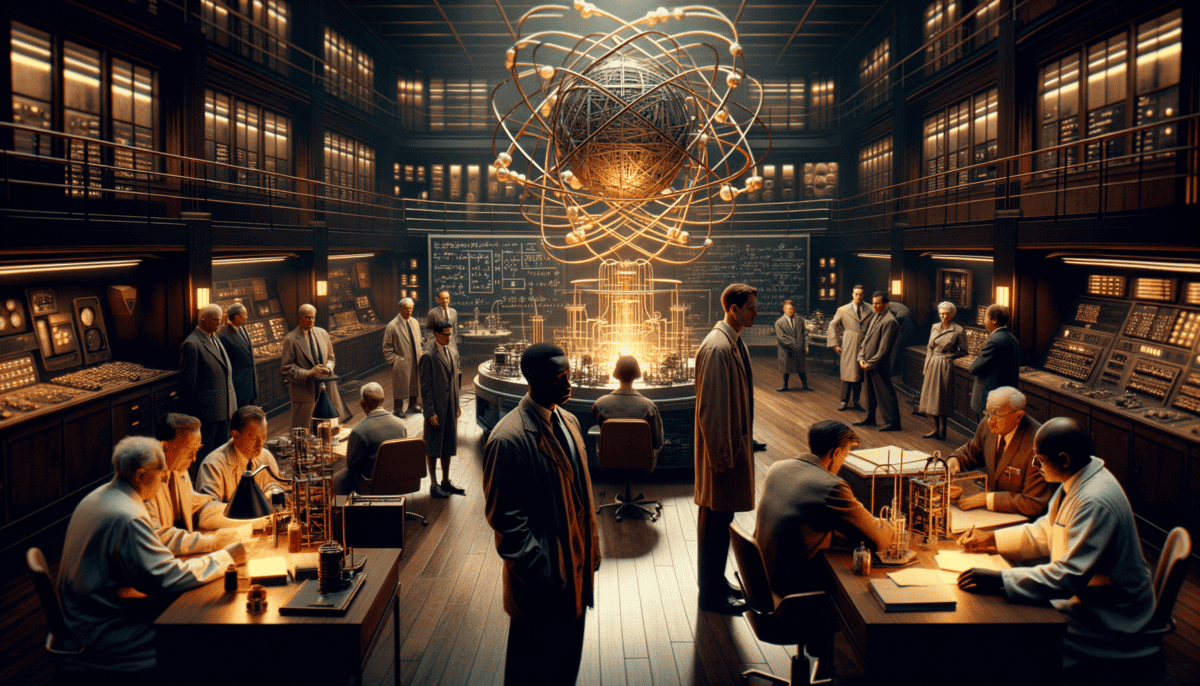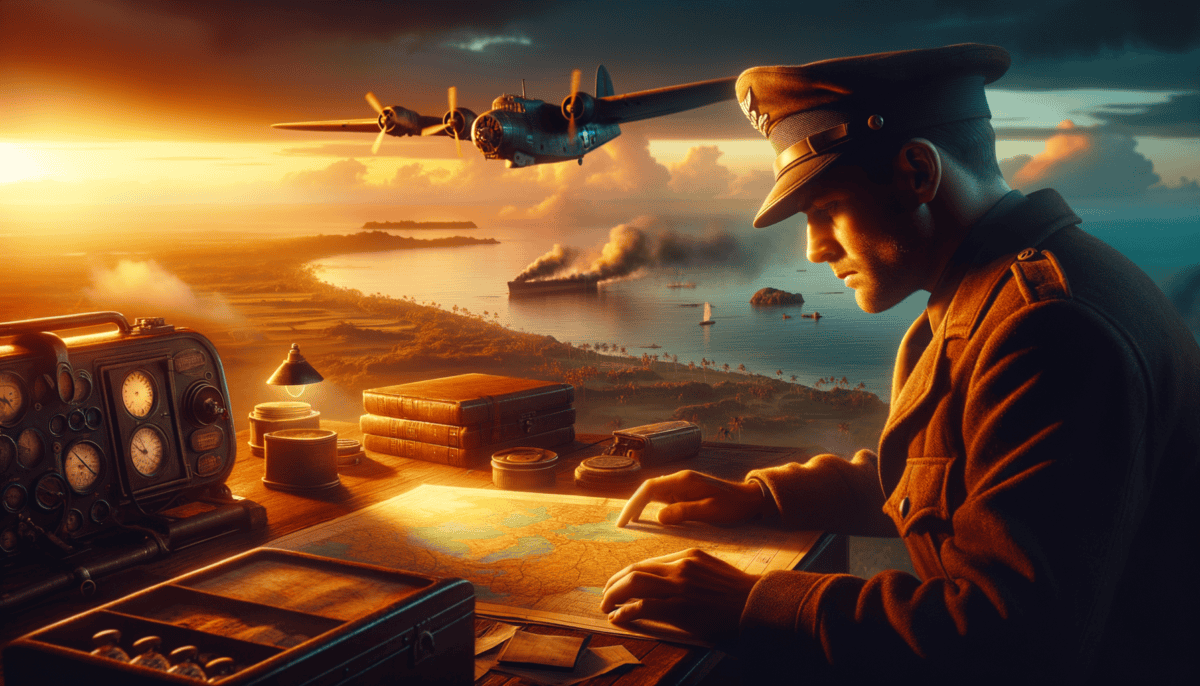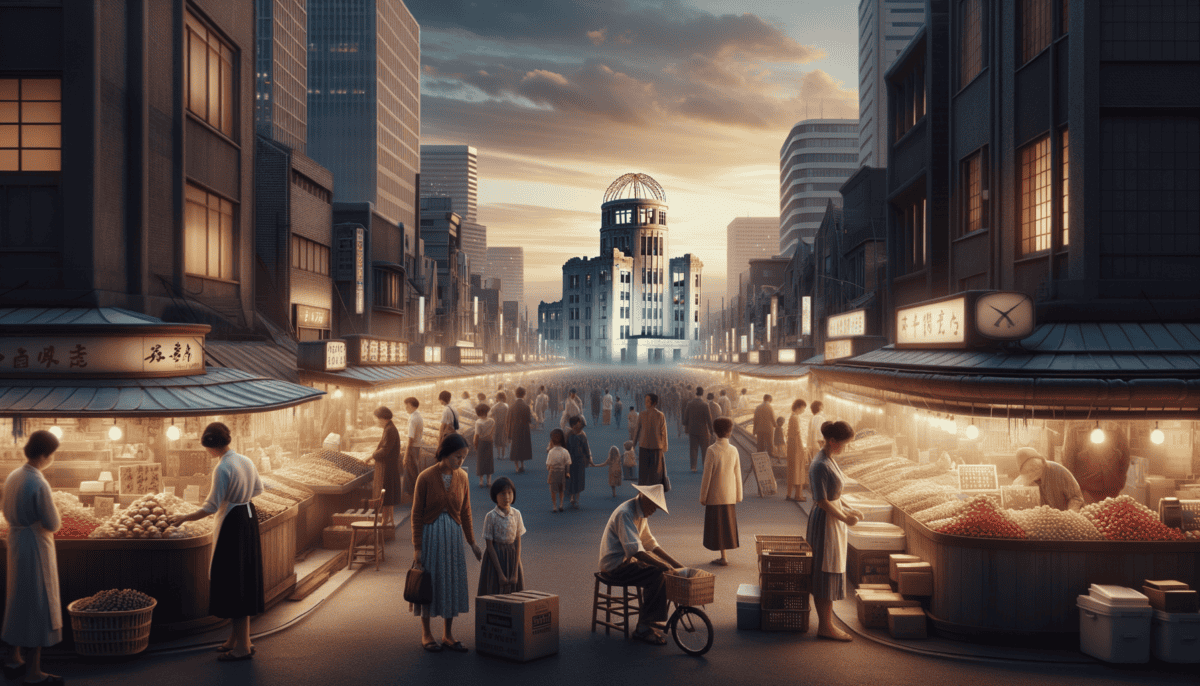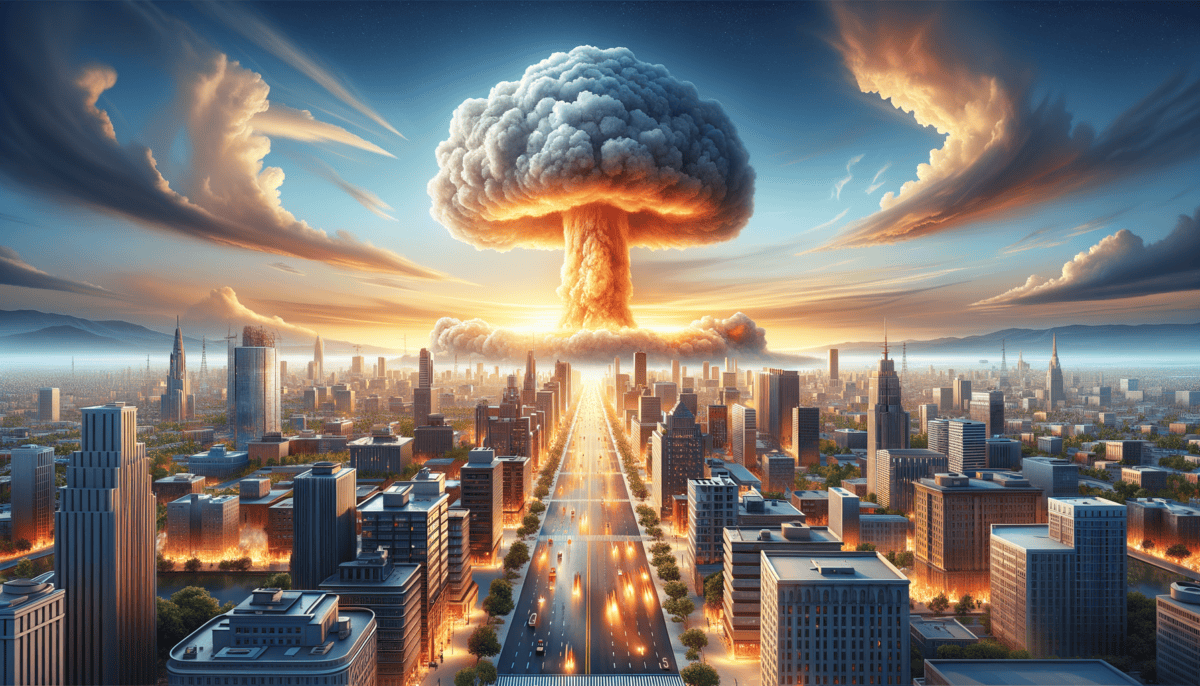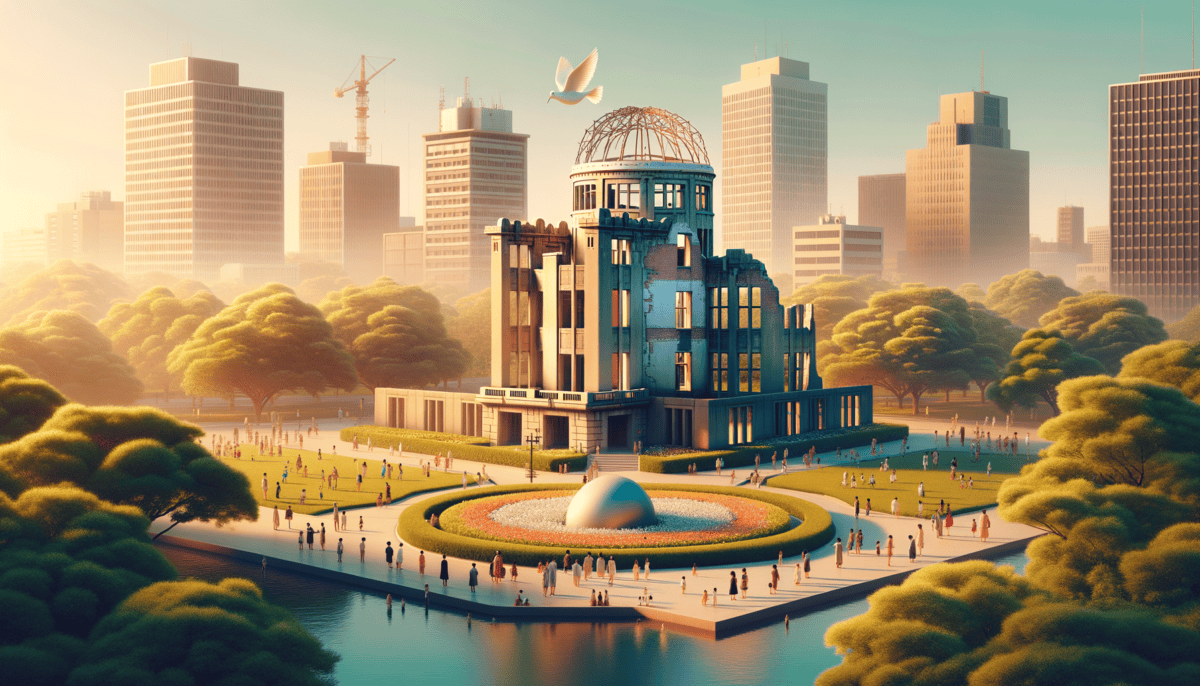A World Changed Forever
The warm summer breeze swept across the quiet streets of Los Alamos, New Mexico, where something big was happening. It was 1945, and the world was different then. A terrible war called World War II was making everyone worried and sad.
Dr. J. Robert Oppenheimer looked out his office window, his thin fingers tapping nervously on his desk. He was a very smart scientist who had a very big job to do.
"We must end this war," he whispered to himself. "But at what cost?"
The secret city of Los Alamos wasn't like other places. It was hidden away in the mountains, and only special people could go there. Scientists, soldiers, and workers all lived together, working on something they called "The Manhattan Project."
• Many countries were fighting
• Millions of people were hurt
• The United States wanted to end the war
• Japan wouldn’t give up
Little Tommy, whose dad worked as a guard, rode his bicycle past the big fences. He didn't know what the grown-ups were doing, but he knew it was important.
"Daddy, why can't I tell my friends where we live?" Tommy asked one night at dinner.
His father smiled sadly. "Because we're working on something that might change the world, son."
In another part of the secret city, Dr. Richard Foster (not his real name – everyone used fake names to stay secret) was writing in his diary:
July 15, 1945
Dear Diary,
Today we got closer to finishing our big project. I wonder if we're doing the right thing. The war is terrible, but what we're making is terrible too.
The scientists worked day and night in their laboratories. They were building something that had never been made before – an atomic bomb. It was like a regular bomb but much, much stronger.
"Dr. Oppenheimer!" a young scientist called out, running into his office. "The test site is ready!"
Oppenheimer nodded slowly. He knew that soon they would test their creation in a place called Trinity. The world would never be the same after that.
Meanwhile, across the ocean in Japan, people were also worried about the war. They didn't know that in America, scientists were building something that would change everything.
The war had been going on for many years. People everywhere wanted it to end. The United States and Japan were fighting very hard. The scientists at Los Alamos thought their new weapon might end the war quickly.
At night, Oppenheimer would often look at the stars through his window. He remembered an old story from a book he liked:
"Now I am become Death, the destroyer of worlds," he said quietly.
The summer days grew hotter, and the work continued. Everyone knew something big was coming, but nobody knew exactly what would happen next. The world held its breath, waiting for what would come in the hot summer of 1945.
Dreams and Nightmares
Dr. Oppenheimer couldn’t sleep. The moon was bright outside his window at Los Alamos, but his mind was darker than the night sky.
“Another bad dream?” his wife Kitty asked softly.
“I keep seeing fire,” he whispered. “So much fire.”
• Would their invention work?
• Could it help end the war?
• Was it too powerful?
• What would happen to the world?
In his lab the next morning, Dr. Edward Smith watched a tiny machine measure invisible things called atoms. His hands shook as he wrote down numbers.
“Look at this,” he called to his friend Dr. Maria Chen. “The energy readings are higher than we thought.”
Maria adjusted her glasses. “That means it could be even stronger than we planned.”
“Sometimes I wonder if we’re opening a door that should stay closed,” Edward said quietly.
Outside, the desert sun made everything hot. Children played near the fence, not knowing their parents were building the most powerful weapon ever made.
The Test Gets Closer
“Two weeks until Trinity,” Oppenheimer told his team. “Everything must be perfect.”
Trinity was the name they gave to the first big test. They would try their new bomb in a empty desert place called Alamogordo.
Safety First!
The scientists made special suits to protect themselves. They built thick walls and deep holes. They needed to be very careful.
That evening, Dr. Chen wrote in her notebook:
Dear Notebook,
Today we finished the calculations. The numbers are scary big. I hope we’re doing the right thing. I dream about helping end this awful war, but I’m afraid of what our work might do.
Little Sally, the guard’s daughter, drew pictures with chalk on the sidewalk. “What does your daddy do?” other kids would ask.
“He helps make sunshine,” she would say, because that’s what her mother told her to say.
The Weight of Knowledge
Oppenheimer walked through the lab late at night. Machines hummed softly. Papers covered with numbers and drawings lay everywhere. He picked up a photo of his young son Peter.
“What kind of world are we making for you?” he whispered.
The next morning brought more work. Scientists checked and double-checked everything. They knew they couldn’t make any mistakes.
An Important Meeting
“The bomb will be ready soon,” Oppenheimer told the army generals. “But we don’t know exactly what will happen when it goes off.”
Some scientists wanted to stop. They wrote letters saying the bomb was too dangerous. But others said they had to finish – to end the war and save lives.
As night fell over Los Alamos, the lights in the labs stayed on. Time was running out. Soon they would know if all their work would change the world forever. And deep down, they were all a little afraid of what that change might mean.
The stars twinkled above the secret city. Tomorrow would bring new problems, new fears, and new hopes. But tonight, the scientists could only wait and wonder about what they had created.
Dawn of Decision
The sun hadn’t risen yet when Colonel Paul Tibbets walked across Tinian Island’s airfield. His footsteps echoed on the concrete as he approached the massive B-29 bomber.
He placed his hand on the cool metal of the plane he had named after his mother – the Enola Gay.
“She’s ready, sir,” called out Captain Robert Lewis, his co-pilot. “Weather looks good for Hiroshima.”
• Colonel Paul Tibbets – Main pilot
• Captain Robert Lewis – Co-pilot
• Major Thomas Ferebee – Person who would drop the bomb
• Captain Theodore Van Kirk – Navigator
• Jacob Beser – Radio expert
“How are you feeling?” Tibbets asked his men during the final meeting.
Major Tom Ferebee, the bombardier, spoke softly. “Like I’m carrying the weight of the world, sir.”
Getting Ready
The crew checked their special plane one last time. They had practiced this mission over and over. But this time was different – this time they carried a new kind of bomb called “Little Boy.” ️
Important Note:
The crew didn’t know exactly what their bomb could do. They just knew it was very powerful.
Captain Van Kirk spread his maps on the table. “We’ll fly this path here,” he said, tracing the line with his finger. “Weather must be perfect to see our target.”
That night, many couldn’t sleep. Private Joe Miller wrote in his diary:
Dear Diary,
Tomorrow we fly a very important mission. The officers look worried. Something big is happening, but they won’t tell us what. I miss home.
The Final Hours
At midnight, the crew ate a special breakfast of eggs, ham, and coffee. The cooks made extra pancakes – comfort food for nervous men.
“Remember your training,” Tibbets told his crew. “This mission could help end the war.”
The Take-Off Time
They would leave very early – at 2:45 in the morning. The dark would help keep them safe.
The mechanics did one final check of the Enola Gay. They patted her silver wings for luck. The weapon specialists carefully loaded the special bomb.
As the crew climbed aboard, the island was quiet except for the sound of waves hitting the shore. Stars sparkled above like diamond dust scattered across black velvet.
“Start engines,” Tibbets commanded.
One by one, the huge propellers began to spin. The plane’s engines roared to life, breaking the pre-dawn silence. Inside the cockpit, instruments glowed with a soft green light.
“Tower, this is Enola Gay,” Tibbets radioed. “Ready for takeoff.”
The huge plane began rolling down the runway, faster and faster. The weight of its secret cargo made it move differently than during practice runs.
As they lifted into the dark sky, no one spoke. They all knew that after today, the world would never be the same.
The Enola Gay disappeared into the night, carrying its crew and its terrible secret toward a sleeping city called Hiroshima.
Morning in Hiroshima
The sun rose over Hiroshima on August 6, 1945. It was going to be another hot summer day. Children walked to school while grown-ups went to work.
“Hurry up, Keiko!” called Mrs. Tanaka to her daughter. “You’ll be late for school!”
Nobody knew this would be their last normal morning. The city was busy and full of life. Streetcars rang their bells as they moved down the streets. The smell of fresh bread came from bakeries.
A Special City
Hiroshima was a pretty city with lots of rivers running through it. People called it the “City of Water.” Many boats moved up and down these rivers carrying food and things people needed.
• Big factories making things for the army
• Schools and houses
• Hospitals
• The castle in the middle of the city
• Many bridges crossing the rivers
“Look at that plane up there!” said little Akio to his mother as they walked to the market. It was one of the air raid warning planes that often flew over the city. ✈️
Getting Ready for the Day
Mr. Yamamoto opened his grocery store just like any other morning. “Good morning!” he called to his neighbors. He didn’t know this would be the last time he would say those words to them.
The Weather That Day:
It was clear and sunny. Perfect for seeing the whole city from above.
In schools, children sat at their desks. Teachers wrote on blackboards. Some kids were helping to clear spaces in the city in case of fires from regular bombs. They didn’t know about the special bomb coming their way.
“Today feels different somehow,” said Dr. Sasaki as he walked to the hospital. “The air seems too quiet.”
The Quiet Morning
At 7:00 AM, the air raid warning sound went off. People were used to this. They looked up at the sky but only saw a few planes. The all-clear signal came soon after.
Mrs. Nakamura made rice balls for her children’s lunch. “Eat well,” she told them. “You need to grow strong.”
Time Was Running Out
It was now 8:00 AM. Most people were at work or school. Nobody knew they had only minutes left of their normal lives.
High above the city, birds flew in the clear blue sky. The sun sparkled on the rivers. Fishermen in their boats called to each other. Mothers hung laundry out to dry in the warm morning air.
At 8:13 AM, some people heard a strange sound high in the sky. A few looked up.
“What’s that?” asked a teacher, pointing at a single B-29 plane flying very high.
At 8:15 AM, there was a flash brighter than the sun…
The peaceful morning in Hiroshima was about to change forever. A new kind of history was about to begin.
The Flash That Changed Everything
At exactly 8:15 AM, a bright light filled the sky over Hiroshima. It was brighter than a thousand suns. ✨
“What’s that light?” little Keiko asked, shielding her eyes. But there was no time for anyone to answer.
The Big Flash
The atomic bomb, named “Little Boy,” fell from the Enola Gay. It took just 43 seconds to reach the city. When it exploded, it made a big fireball in the sky.
• A super bright flash
• A very loud boom
• A giant mushroom cloud
• Strong winds that knocked buildings down
• A wave of heat hotter than the sun
The City Changes
The blast was so strong it knocked down most buildings. Trees fell over. Windows broke into tiny pieces. The wind was stronger than any typhoon.
“It felt like the sun had fallen from the sky,” said Mr. Tanaka, who survived that day.
The pretty rivers of Hiroshima turned into hot steam. The castle in the middle of the city fell down. Bridges bent like paper in the wind.
People Try to Help
Dr. Sasaki was knocked down in the hospital. When he got up, everything was different. The hospital was full of people who needed help.
The Brave Helpers:
Doctors, nurses, and regular people worked hard to help others. They were heroes that day.
Many people ran to the rivers. They were very thirsty and burned from the heat. The water looked cool and safe.
The Dark Cloud
A big mushroom cloud rose up into the sky. It was taller than any mountain. Black rain started to fall. This rain was not normal – it was full of bad things from the bomb. ☔
“The sky turned dark, like night came in the middle of the morning,” remembered Mrs. Yamamoto.
Everything Changes
The pretty city of Hiroshima was gone in just one minute. Where there were buildings, now there was nothing. Where there were trees, now there were just burned sticks. ️
The bomb changed more than buildings. It changed the whole world. People learned how powerful science could be.
Some brave people started helping others right away. They didn’t know about the dangerous radiation from the bomb. They just knew their friends and neighbors needed help. ❤️
“We must help each other,” said a teacher to her students as they huddled together in the ruins.
The Long Day
As the day went on, more people came to help. Doctors from other cities rushed to Hiroshima. But this was a new kind of hurt that nobody knew how to fix.
The sun set on a very different Hiroshima that evening. The city that woke up to a normal morning would never be the same. But the story of what happened there would teach the world important lessons about peace.
A City Rises Again
The morning after the bombing, the sun rose over a different Hiroshima. The city that once had pretty streets and happy homes was gone. But something amazing was about to happen.
“We will build again,” whispered Mrs. Tanaka to her children as they looked at their broken city. “We will make it even better.”
People Come Together
All around Hiroshima, people started helping each other. They shared their food. They shared their homes. They worked together to clean up the broken buildings. ❤️
• Giving food to hungry people
• Finding homes for families
• Taking care of sick friends
• Building new schools
• Planting new trees
A Garden of Hope
Something special happened in Hiroshima. Where the bomb had burned everything, new flowers started to grow. They were red flowers called canna lilies.
“Look!” said little Keiko, pointing at a red flower pushing through the burned ground. “Life is coming back!”
Building Peace
The people of Hiroshima made a big decision. They would turn their city into a place that teaches people about peace. They built a beautiful park called Peace Memorial Park. ️
Peace Park Today:
Every year, people from all over the world visit to learn about peace and remember what happened.
The Paper Cranes
A little girl named Sadako started folding paper cranes. She believed if she made 1,000 cranes, she would get better from being sick from the bomb. Now children all over the world fold paper cranes for peace.
The World Learns
The story of Hiroshima taught everyone an important lesson. War hurts too many people. Countries started talking more and fighting less.
“We must be kind to each other,” says Mr. Yoshida, who tells his story to children today. “That’s how we make peace.”
Hiroshima Today
Now Hiroshima is a beautiful city again. It has tall buildings, pretty parks, and happy families. But it never forgot its important message about peace.
Every August 6th, people in Hiroshima float paper lanterns on the river. The lights remind us to work for peace every day.
The story of Hiroshima shows us something important: even after the worst things happen, people can work together to make things better. The city that saw the worst of war now teaches the world about peace.
“Remember Hiroshima,” say the peace guides in the city today. “And remember that you can help make peace too.”
Hiroshima’s story isn’t just about what was lost. It’s about hope, healing, and how people can make good things happen even after bad times. The city that once saw the darkest day now shines with the light of peace.


